2016 PEUGEOT 5008 instrument panel
[x] Cancel search: instrument panelPage 190 of 364

188
5008_en_Chap08_conduite_ed01-2015
Parking space sensors
After measuring the parking space available
between two vehicles or obstacles, this system
gives you information on:
-
t
he possibility of fitting into a free space,
depending on the dimensions of your
vehicle and the distances needed for
manoeuvring,
-
t
he level of difficulty of the manoeuvre to
be performed.
The system does not measure spaces which
are clearly much smaller or larger than the size
of the vehicle.Displays in the instrument panel
The parking space sensor function
warning lamp can have three
different states:
-
o
ff: the function is not selected,
-
o
n fixed: the function is selected but the
conditions for measurement are not yet met
(direction indicator not operating, speed
too high) or the measurement phase has
ended,
-
f
lashing: measurement is in progress or
the message is being displayed. You can activate the "parking space sensor"
function by pressing button A
. The fixed
illumination of the warning lamp indicates that
the function is selected.
Driving
Page 193 of 364
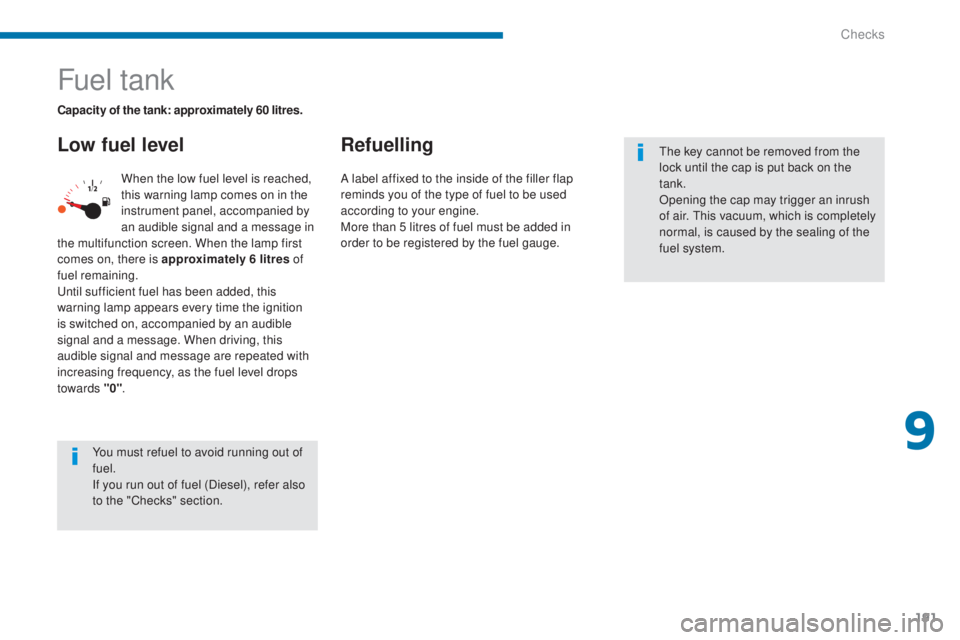
191
5008_en_Chap09_verifications_ed01-2015
Fuel tank
Low fuel levelRefuelling
When the low fuel level is reached,
this warning lamp comes on in the
instrument panel, accompanied by
an audible signal and a message in
the multifunction screen. When the lamp first
comes on, there is approximately 6 litres of
fuel remaining.
Until sufficient fuel has been added, this
warning lamp appears every time the ignition
is switched on, accompanied by an audible
signal and a message. When driving, this
audible signal and message are repeated with
increasing frequency, as the fuel level drops
towards "0" .
Capacity of the tank: approximately 60 litres.
The key cannot be removed from the
lock until the cap is put back on the
tank.
Opening the cap may trigger an inrush
of air. This vacuum, which is completely
normal, is caused by the sealing of the
fuel system.
You must refuel to avoid running out of
fuel.
If you run out of fuel (Diesel), refer also
to the "Checks" section. A label affixed to the inside of the filler flap
reminds you of the type of fuel to be used
according to your engine.
More than 5 litres of fuel must be added in
order to be registered by the fuel gauge.
9
Checks
Page 201 of 364
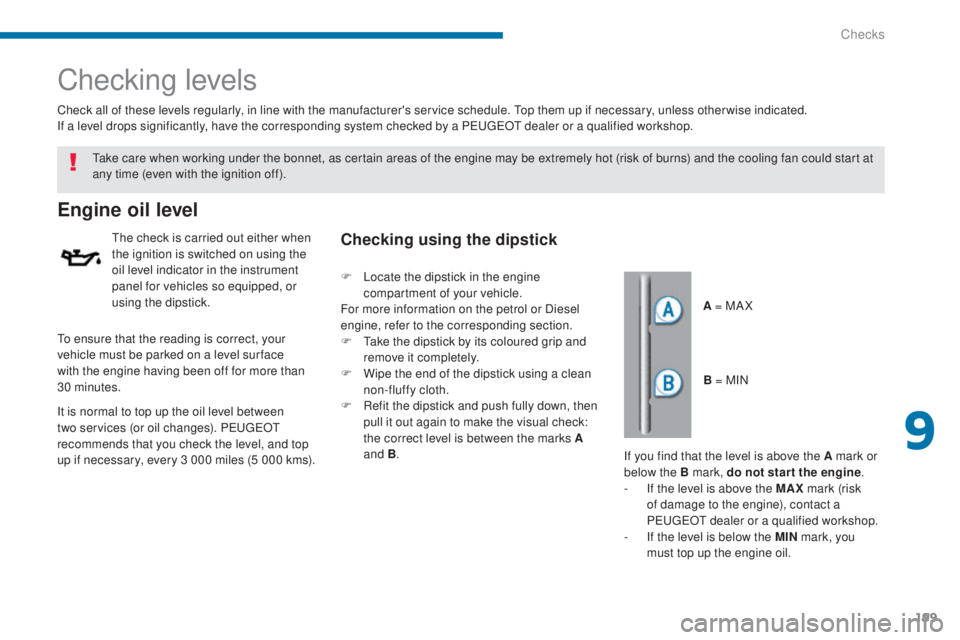
199
5008_en_Chap09_verifications_ed01-2015
Checking levels
Engine oil level
The check is carried out either when
the ignition is switched on using the
oil level indicator in the instrument
panel for vehicles so equipped, or
using the dipstick.
Check all of these levels regularly, in line with the manufacturer's service schedule. Top them up if necessary, unless other wise indicated.
If a level drops significantly, have the corresponding system checked by a PEUGEOT dealer or a qualified workshop.
It is normal to top up the oil level between
two services (or oil changes). PEUGEOT
recommends that you check the level, and top
up if necessary, every 3 000 miles (5 000 kms). Take care when working under the bonnet, as certain areas of the engine may be extremely hot (risk of burns) and the cooling fan could start at
any time (even with the ignition off).
If you find that the level is above the A mark or
below the B mark, do not star t the engine.
-
I
f the level is above the MAX mark (risk
of damage to the engine), contact a
PEUGEOT dealer or a qualified workshop.
-
I
f the level is below the MIN mark, you
must top up the engine oil. A = MA X
To ensure that the reading is correct, your
vehicle must be parked on a level sur face
with the engine having been off for more than
30
minutes.Checking using the dipstick
B = MIN
F
L
ocate the dipstick in the engine
compartment of your vehicle.
For more information on the petrol or Diesel
engine, refer to the corresponding section.
F
T
ake the dipstick by its coloured grip and
remove it completely.
F
W
ipe the end of the dipstick using a clean
non-fluffy cloth.
F
R
efit the dipstick and push fully down, then
pull it out again to make the visual check:
the correct level is between the marks A
and B .
9
Checks
Page 202 of 364
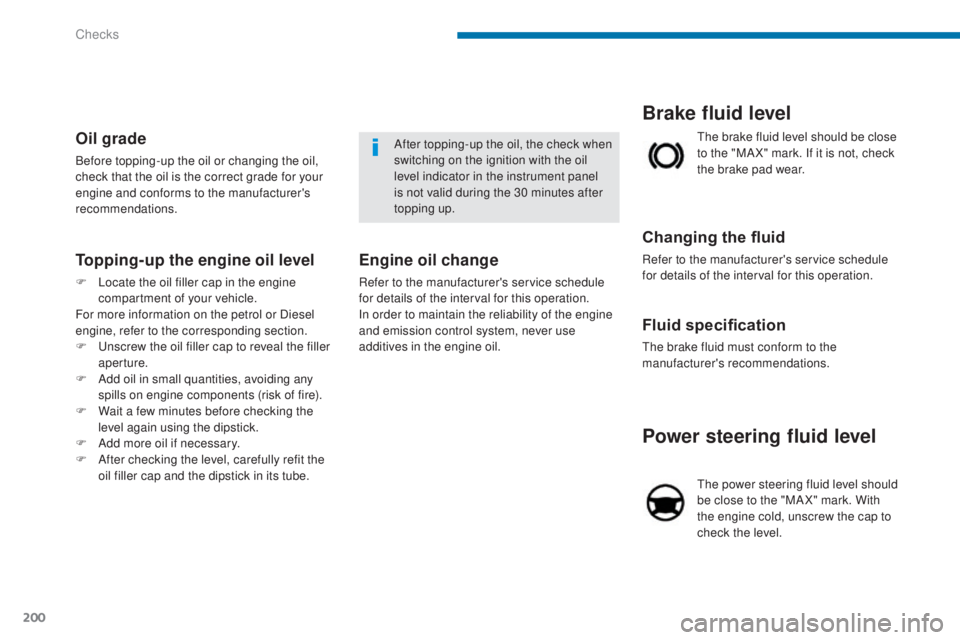
200
5008_en_Chap09_verifications_ed01-2015
Power steering fluid level
The power steering fluid level should
be close to the "MA X" mark. With
the engine cold, unscrew the cap to
check the level.
Fluid specification
The brake fluid must conform to the
manufacturer's recommendations.
Changing the fluid
Refer to the manufacturer's service schedule
for details of the interval for this operation.
Brake fluid level
The brake fluid level should be close
to the "MA X" mark. If it is not, check
the brake pad wear.
After topping-up the oil, the check when
switching on the ignition with the oil
level indicator in the instrument panel
is not valid during the 30 minutes after
topping up.Oil grade
Before topping-up the oil or changing the oil,
check that the oil is the correct grade for your
engine and conforms to the manufacturer's
recommendations.
Topping-up the engine oil level
F Locate the oil filler cap in the engine
compartment of your vehicle.
For more information on the petrol or Diesel
engine, refer to the corresponding section.
F
U
nscrew the oil filler cap to reveal the filler
aperture.
F
A
dd oil in small quantities, avoiding any
spills on engine components (risk of fire).
F
W
ait a few minutes before checking the
level again using the dipstick.
F
A
dd more oil if necessary.
F
A
fter checking the level, carefully refit the
oil filler cap and the dipstick in its tube.
Engine oil change
Refer to the manufacturer's service schedule
for details of the interval for this operation.
In order to maintain the reliability of the engine
and emission control system, never use
additives in the engine oil.
Checks
Page 203 of 364

201
5008_en_Chap09_verifications_ed01-2015
Diesel additive level (Diesel
engine with particle filter)
Used products
To p p i n g u p
This additive must be topped up by a
PEUGEOT dealer or a qualified workshop
without delay.A low additive level is indicated by
illumination of this warning lamp,
accompanied by an audible warning
and a message in the instrument panel screen.Fluid specification
For optimum cleaning and to avoid freezing,
this fluid must not be topped up with or
replaced with plain water. In the case of vehicles fitted with
headlamp washers, the low fluid level
is indicated by an audible signal and
a message in the instrument panel
screen.
Top up the reservoir when you next stop the
vehicle.
Screenwash and headlamp
wash fluid
Avoid prolonged contact of used oil or
fluids with the skin.
Most of these fluids are harmful to
health or indeed very corrosive.
Do not discard used oil or fluids into
sewers or onto the ground.
Take used oil to a PEUGEOT dealer or
a qualified workshop (France) or to an
authorised waste disposal site.
The cooling fan may star t after switching
off the engine: take care with ar ticles and
clothing that might become caught by the
fan blades.
Fluid specification
The coolant must conform to the
manufacturer's recommendations.
Coolant level
The coolant level should be close
to the "MA X" mark but should never
exceed it.
When the engine is warm, the
temperature of the coolant is regulated by
the fan.
In addition, as the cooling system is pressurised,
wait at least one hour after switching off the
engine before carrying out any work.
To avoid any risk of scalding, unscrew the cap
by two turns to allow the pressure to drop. When
the pressure has dropped, remove the cap and
top up the level. In wintry conditions, the use of an
ethyl alcohol or methanol base fluid is
recommended.
9
Checks
Page 207 of 364
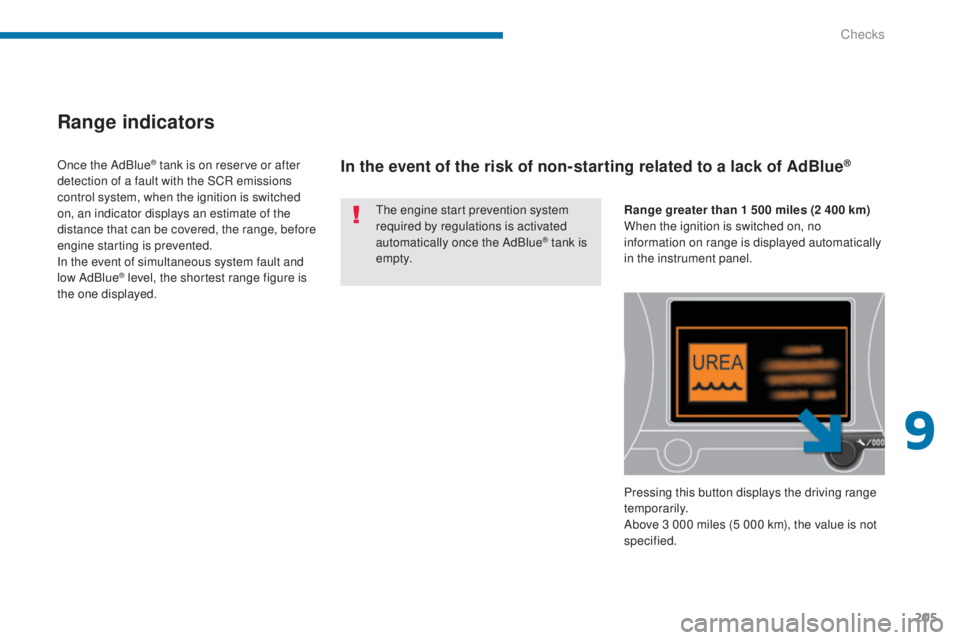
205
5008_en_Chap09_verifications_ed01-2015
Range indicators
The engine start prevention system
required by regulations is activated
automatically once the AdBlue
® tank is
e m pt y.
Once the AdBlue
® tank is on reserve or after
detection of a fault with the SCR emissions
control system, when the ignition is switched
on, an indicator displays an estimate of the
distance that can be covered, the range, before
engine starting is prevented.
In the event of simultaneous system fault and
low AdBlue
® level, the shortest range figure is
the one displayed. Range greater than 1 500 miles (2 400 km)
When the ignition is switched on, no
information on range is displayed automatically
in the instrument panel.
Pressing this button displays the driving range
temporarily.
Above 3 000 miles (5 000 km), the value is not
specified.
In the event of the risk of non-starting related to a lack of AdBlue®
9
Checks
Page 241 of 364
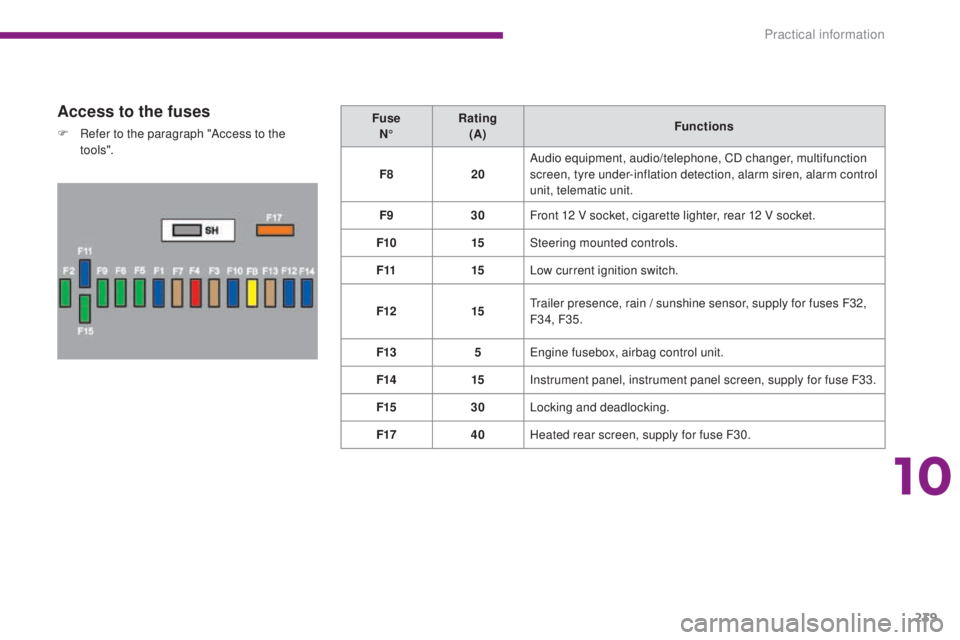
239
5008_en_Chap10_infos-pratiques_ed01-2015
Access to the fuses
F Refer to the paragraph "Access to the to o ls". Fuse
N° Rating
(A) Functions
F8 20Audio equipment, audio/telephone, CD changer, multifunction
screen, tyre under-inflation detection, alarm siren, alarm control
unit, telematic unit.
F9 30Front 12 V socket, cigarette lighter, rear 12 V socket.
F10 15Steering mounted controls.
F11 15Low current ignition switch.
F12 15Trailer presence, rain / sunshine sensor, supply for fuses F32,
F34, F35.
F13 5Engine fusebox, airbag control unit.
F14 15Instrument panel, instrument panel screen, supply for fuse F33.
F15 30Locking and deadlocking.
F17 40Heated rear screen, supply for fuse F30.
10
Practical information
Page 353 of 364
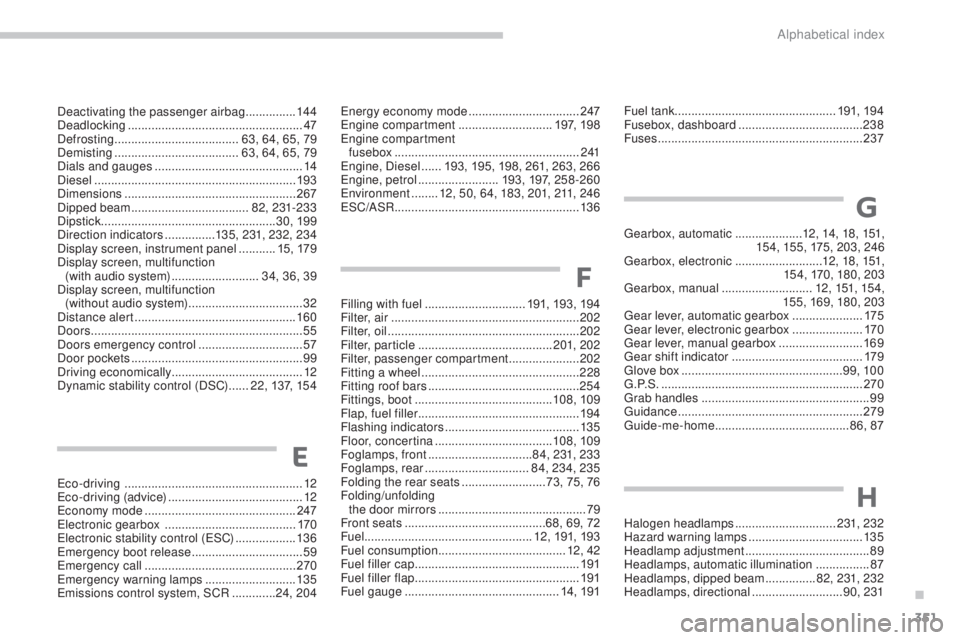
351
5008_en_Chap13_index-alpha_ed01-2015
F
E
H
G
Deactivating the passenger airbag ...............14 4
Deadlocking .................................................... 47
Defrosting
..................................... 63, 64 , 65, 79
Demisting
...............................
......63, 64, 65, 79
Dials and gauges
............................................ 14
Diesel
............................................................ 193
Dimensions
................................................... 267
Dipped beam
...............................
....82, 231-233
Dipstick
................
.................................... 30, 19 9
Direction indicators
...............13 5, 231 , 232 , 234
Display screen, instrument panel
...........15, 179
Display screen, multifunction (with audio system)
..........................34, 36 , 39
Display screen, multifunction (without audio system)
..................................32
Distance alert
................................................ 160
Doors
............................................................... 55
Doors emergency control
...............................57
Door pockets
................................................... 99
D
riving economically ....................................... 12
Dynamic stability control (DSC)
...... 2
2, 137 , 15 4 Energy economy mode
.................................
247
Engine compartment ............................197, 198
Engine compartment fusebox
.......................................................2 41
Engine, Diesel
...... 19
3, 195 , 198 , 261, 263 , 266
Engine, petrol
........................193, 197 , 258-260
Environment
........ 12,
50, 64, 183, 201, 211, 246
ESC/ASR
...............................
........................13 6
Filling with fuel
..............................191, 193, 194
Filter, air
...............
.........................................202
Filter, oil
.........................................................202
Filter, particle
........................................201, 202
Filter, passenger compartment
.....................202
Fitting a wheel
...............................
................228
Fitting roof bars
.............................................254
Fittings, boot
......................................... 10
8, 109
Flap, fuel filler
...............................
.................19 4
Flashing indicators
........................................13 5
Floor, concertina
...................................108, 109
Foglamps, front
...............................84, 231 , 233
Foglamps, rear
...............................84, 234, 235
Folding the rear seats
.........................73, 75 , 76
Folding/unfolding the door mirrors
............................................79
Front seats
..........................................68, 69 , 72
Fuel .................................................. 12, 191 , 193
Fuel consumption
...................................... 12,
42
Fuel filler cap
.................................................191
Fuel filler flap
.................................................191
Fuel gauge
..............................................14, 191
Eco-driving
..................................................... 12
Eco-driving (advice)
........................................ 12
Economy mode
............................................. 247
Electronic gearbox
....................................... 170
Electronic stability control (ESC)
..................13 6
Emergency boot release
................................. 59
E
mergency call
............................................. 2
70
Emergency warning lamps
........................... 13
5
Emissions control system, SCR
.............24, 204 Fuel tank
................................................ 191, 19 4
Fusebox, dashboard .....................................238
Fuses
.............................................................237
Halogen headlamps
..............................231, 232
Hazard warning lamps
..................................13 5
Headlamp adjustment
.....................................89
Headlamps, automatic illumination
................87
Headlamps, dipped beam
...............82, 231, 232
Headlamps, directional
........................... 90,
231
Gearbox, automatic
....................12, 14 , 18 , 151 ,
15 4 , 155 , 175, 203 , 246
Gearbox, electronic
..........................12, 18 , 151 ,
15 4 , 170 , 180 , 203
Gearbox, manual
...........................12, 151 , 15 4 ,
155 , 169 , 180, 203
Gear lever, automatic gearbox
..................... 17
5
Gear lever, electronic gearbox
.....................170
Gear lever, manual gearbox
.........................169
Gear shift indicator
.......................................179
Glove box
................................................99, 10 0
G . P. S .
............................................................270
Grab handles
.................................................. 99
G
uidance
.......................................................279
Guide-me-home
........................................86, 87
.
Alphabetical index